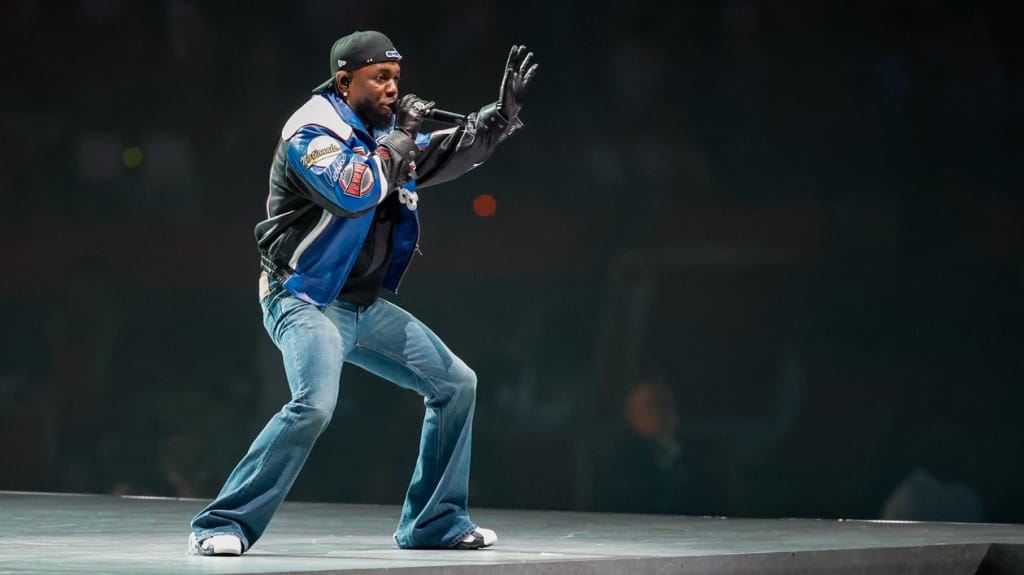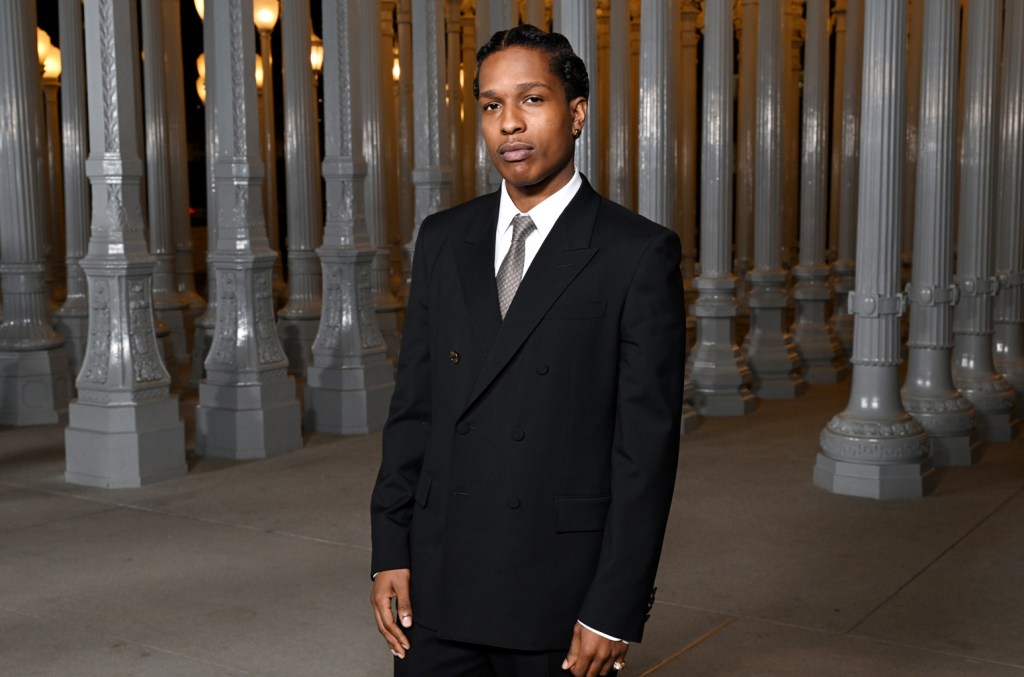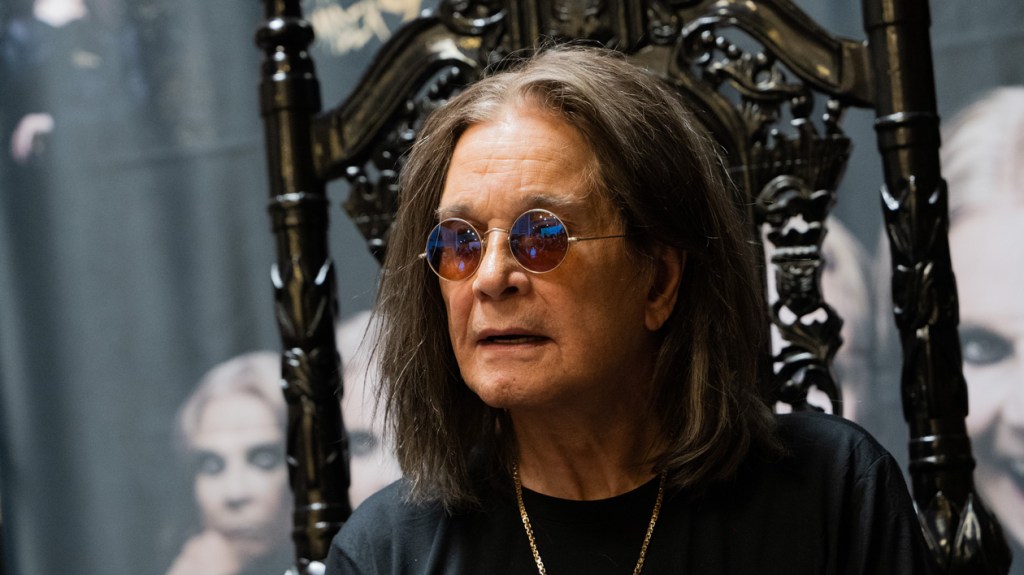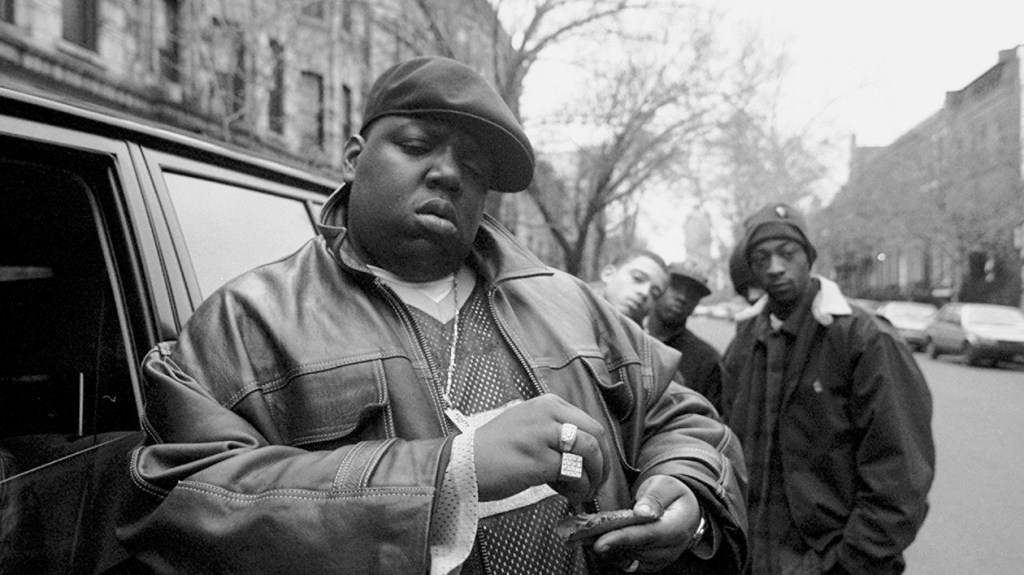Legal
Page: 35
This is The Legal Beat, a weekly newsletter about music law from Billboard Pro, offering you a one-stop cheat sheet of big new cases, important rulings and all the fun stuff in between.
This week: Kendrick Lamar plays “Not Like Us” during his Super Bowl halftime show despite Drake’s defamation lawsuit; an appeals court sends a case over Jimi Hendrix’s music to trial; the estate of Notorious B.I.G. sues over a famed photo; and much more.
THE BIG STORY: Say, Drake…
If a team of lawyers tried to dissuade Kendrick Lamar from performing “Not Like Us” during Sunday night’s Super Bowl halftime show, they didn’t do a great job.
Trending on Billboard
After much speculation about whether or not the rapper would play his chart-topping, Grammy-sweeping hit at the Superdome – a performance that came weeks after Drake sued Universal Music Group over allegations that the song defamed him by calling him a pedophile — Kendrick really didn’t hold back much.
With a trolling grin, he looked directly into camera and made eye contact with 120 million viewers when he rapped “Say, Drake, I hear you like ’em young” – a lyric he then followed up with lines like “You better not ever go to cell block one” and “Just make sure you hide your lil’ sister from him.” If anyone was expecting him to avoid the controversy entirely, think again.
Lamar did avoid saying the actual word “pedophile,” but that hardly made a difference when thousands in the crowd sang it for him — and millions more at home knew exactly what was missing. And no such omission spared Drake from the song’s comedic punchline: “Tryna strike a chord and it’s probably A minnnnorrrrr.”
The very structure of Kendrick’s set seemed designed to mock the idea that a lawsuit might stop him. Early in the show, he explicitly referenced the case, saying “I wanna do their favorite song, but they love to sue” before teasing the song’s infectious four-note riff. When Lamar quickly moved on to another song, it seemed like he wanted the fans to think that might be it. Maybe it was a happy compromise? A quick nod that wouldn’t give the lawyers heartburn?
Lol, nope: Minutes later, Kendrick launched into a full-blown rendition of “Not Like Us” on the world’s biggest stage. “They tried to rig the game,” he said right before he started, “but you can’t fake influence.” For good measure, Lamar brought out Serena Williams – rumored to be a one-time romantic partner of Drake – to crip walk on his metaphorical grave.
What does it all mean for the lawsuit? For Kendrick, probably not much. Don’t forget: he isn’t actually named as a defendant, and Drake’s lawyers have taken great pains to stress that their client is only suing a malevolent record label that boosted a defamatory song, not the rival rapper who created it: “UMG may spin this complaint as a rap beef gone legal,” they wrote in the original complaint, “but this lawsuit is not about a war of words between artists.”That stance doesn’t appear to be changing. Just hours before Kendrick took the stage in New Orleans, Drake’s lawyers released a new statement on the case that harshly attacked UMG – but they never mentioned the man himself. It would be hard to reverse course now, even after that stare into the camera.
Perhaps Drake’s legal team will try to add Fox or the NFL or even Apple (the show’s sponsor) as defendants, claiming they gave Kendrick a platform to republish lyrics they knew were defamatory. Or maybe they’ll cite the performance as more ammo against UMG — the latest example of how the popularity of the “Not Like Us” is harming Drake’s reputation. As CNN wrote after the game, in which the Philadelphia Eagles thrashed the Kansas City Chiefs: “Drake lost worse than the Chiefs at the Super Bowl.”
At the end of the day, those secondary moves won’t matter much unless a federal judge eventually rules that “Not Like Us” is actually defamatory in the first place. And as I wrote last week, legal experts are skeptical that’s going to happen.
Stay tuned at Billboard for more as Drake’s case moves forward – we’ll keep you updated on any major (or minnnnorrrrr) developments.
Other top stories this week…
JIMI HENDRIX TRIAL – A long-running legal battle over the rights to Jimi Hendrix’s music is headed to trial after a U.K. appeals court ruled against Sony Music. The case was filed by the estates of his two Jimi Hendrix Experience bandmates (bassist Noel Redding and drummer Mitch Mitchell), who say they own part of the copyrights to the trio’s albums and that Sony owes them millions. After the appeals court refused Sony’s renewed bid to dismiss the case, a trial is tentatively set for December in London.
BIGGIE BIGGIE BIGGIE – The estate of legendary rapper Notorious B.I.G. filed an infringement lawsuit against Target, Home Depot and others over allegations that they sold unauthorized canvas prints of a famed photo called the “King of New York.” Joined by the photographer who snapped the image, the estate accused a company called iCanvas of showing a “disdain for intellectual property law” by creating the prints sold by the big box stores: “Defendants specifically chose to use Mr. Wallace’s persona, name, image, likeness … in an attempt to capitalize on their fame and extraordinary financial value.”
A “WILD” COPYCAT? – MTV owner Viacom filed a lawsuit claiming that Nick Cannon’s new comedy battle rap game show (Bad vs. Wild) is a “flagrant” copycat of his long-running series Wild ’N Out. Notably, the lawsuit targeted only the streaming service that produces the show, Zeus Network, and not Cannon himself – claiming that the streamer effectively poached the star and is now “cosplaying” as successor to MTV’s Wild: “Zeus has chosen the path of least resistance: stealing the fruits of Viacom’s goodwill and decades of labor and innovation, and pawning it off as its own original idea.”
SUCH A LOVELY MESS – A year after the spectacular implosion of a criminal trial over the Eagles legendary 1976 album Hotel California, one of the accused men filed a civil lawsuit against Don Henley and longtime manager Irving Azoff over accusations they engaged in a “malicious prosecution.” The new case, filed by rare-books dealer Glenn Horowitz, says Henley knew the handwritten notes at the center of the trial were not stolen but misled authorities into bringing the charges. The trial ended abruptly last spring after new evidence cast doubt on whether Henley’s materials were stolen in the first place, prompting a judge to suggest prosecutors had been “manipulated” into filing the case.
MEGAN THEE PLAINTIFF – A federal judge ruled that Megan Thee Stallion can proceed with a defamation lawsuit accusing social media personality Milagro Gramz of waging a “campaign of harassment” against the star on behalf of Tory Lanez, who was convicted in 2022 of shooting the star rapper during an argument. The judge said Megan had made a “compelling case” that the blogger had defamed her with her posts, including those that suggested the star lied in her testimony during Lanez’s trial: “Plaintiff’s claims extend far beyond mere negligence — they paint a picture of an intentional campaign to destroy her reputation.”
OZZY SUED OVER OZZY PIC – Ozzy Osbourne was hit with a copyright lawsuit for allegedly posting images of himself to Instagram and other social media platforms, filed by a veteran rock photographer who snapped the pictures. The legendary rocker is just the latest to celeb to face that kind of bizarre-sounding lawsuit, joining the ranks of Miley Cyrus, Dua Lipa, Justin Bieber and many others. Once again for those in the back: the copyrights to a photo are almost always retained by the person who took it, and simply appearing in an image does not give a celebrity the right to repost it.
POP SMOKE PLEA DEAL – Corey Walker, a man charged with murder over the killing of Pop Smoke (Bashar Jackson), reached a deal with prosecutors to avoid a looming trial, pleading guilty to lesser charges of voluntary manslaughter and home invasion robbery that will see him serve 29 years in prison. The actual triggerman in the 2020 shooting, an unnamed 15 year old, admitted to the killing in 2023 and was sentenced as a juvenile to detention until is 25.
Don Henley and his longtime manager Irving Azoff are being sued by one of the men who was criminally charged — and later vindicated — for allegedly attempting to sell handwritten lyrics connected to the Eagles‘ 1976 album Hotel California, claiming they and their attorneys engaged in a “malicious prosecution” that harmed his reputation and caused him financial losses and emotional distress.
The complaint, filed in New York state court on Thursday (Feb. 6), was filed against Henley, Azoff and the firms that represented them in their case: Manatt, Phelps & Phillips and Loeb & Loeb. In it, Horowitz claims the parties falsely alleged that he and his two co-defendants in the criminal case “knew or had reason to believe” that the lyric sheets “had been unlawfully obtained” and nonetheless attempted to profit off of them via an online auction. However, Horowitz claims the men and their attorneys knew all along that the notes had been acquired through legal means in the first place.
Trending on Billboard
Horowitz, a rare book dealer, and his co-defendants — Rock & Roll Hall of Fame curator Craig Inciardi and memorabilia auctioneer Edward Kosinski — were criminally charged in 2022 over an alleged conspiracy to resell the lyrics that had been handwritten by Henley while working on the Eagles’ iconic Hotel California album. At the time, prosecutors had accused the three men of hiding the fact that the documents had been stolen from Henley’s home by Ed Sanders, a journalist hired by Henley and Azoff to write a never-published book on the Eagles in the late 1970s.
But in a stunning turnaround in March 2024, Manhattan prosecutors dropped the case after Henley produced new evidence previously withheld under attorney-client privilege that cast doubt on his and Azoff’s allegations. The judge in the case subsequently dismissed the charges and chastised Henley, Azoff and their attorneys for “obfuscat[ing] and hid[ing] information that they believed would be damaging to their position that the lyric sheets were stolen.”
According to Horowitz’s attorney Caitlin Robin, the evidence cited by prosecutors and the judge in dropping the charges — a series of emails between Henley, Azoff and their attorneys — proves they were aware that Sanders had legally obtained the lyric sheets in the course of writing the never-published Eagles book. Nonetheless, she alleges they “purposefully withheld any disclosure thereof because they knew it would exculpate Plaintiff GLENN HOROWITZ and essentially destroy the fraudulent allegations they made about him.”
As a result of his “unjust prosecution,” Horowitz claims he “was deprived of his liberty and suffered humiliation, defamation, media harassment, diminished reputation, loss of business and/or loss of wages amounting in more than ten million dollars ($10,000,000.00), in addition to mental anguish, indignity, frustration and financial loss.” The complaint further alleges that Horowitz’s wife Tracey (who is listed as a co-plaintiff) also “suffered humiliation, defamation, media harassment, diminished reputation, and mental and emotional anguish” as a result of her husband’s prosecution.
In a statement sent to Billboard, Henley and Azoff’s attorney Dan Petrocelli said, “Don Henley was a witness and a victim in a criminal trial brought by the Manhattan District Attorney after a formal indictment of Glenn Horowitz by a New York grand jury. The indictment highlighted the dark underbelly of the memorabilia business that exploited the brazen, unauthorized taking and selling of Mr. Henley’s handwritten lyrics. The only malicious prosecution involved here is the filing of this case by Mr. Horowitz.”
The Horowitzes are asking for damages “in excess of the jurisdictional limits of all the lower Courts of the State of New York.”
Manatt, Phelps & Phillips and Loeb & Loeb did not immediately respond to Billboard‘s requests for comment.
Do you know what the initials “AWGE” stand for? Don’t feel too bad because only a few people know the answer to that, and apparently it’s a big secret. AWGE is the name of A$AP Rocky‘s creative agency and record label, and the meaning of what the letters stand for has never been made clear. […]
Megan Thee Stallion can proceed with a defamation lawsuit accusing social media personality Milagro Gramz of waging a “campaign of harassment” against the star on behalf of Tory Lanez, a federal judge says.
The rapper sued Gramz (Milagro Cooper) last year, claiming the YouTuber had been “churning out falsehoods” about the high-profile criminal case against Lanez, in which he was convicted of shooting Megan in the foot during a 2020 dispute in the Hollywood Hills.
In a 25-page decision on Friday (Feb. 7), Judge Cecilia Altonaga denied a request by Gramz to dismiss the case, saying Megan had made a “compelling case” that the blogger had defamed her by claiming the star lied during Lanez’s trial and that she was “mentally retarded.”
“Plaintiff’s claims extend far beyond mere negligence — they paint a picture of an intentional campaign to destroy her reputation,” the judge wrote. “That is more than enough to [deny the motion to dismiss].”
The judge also refused to dismiss Megan’s other claims against Gramz, including that Gramz had violated a Florida state law by sharing a pornographic “deepfake” of the rapper. Defense attorneys had argued that Gramz had not actually shared the clip merely by “liking” it on X, but Judge Altonaga noted Friday that she’d allegedly done more than that.
“By ‘liking’ an X.com post that featured the deepfake video, the video was exhibited on defendant’s X.com account’s ‘Likes’ page,” the judge wrote. “Defendant also brought the video ‘before the public’ when she allegedly directed viewers of her post to click on her ‘Likes’ page where the video had been archived.”
The judge did dismiss one claim — Megan’s accusation of cyberstalking — but allowed her to refile the case this month to try to fix the error.
In a statement to Billboard, Gramz’s attorney Michael A. Pancier stressed that the decision was an early-stage ruling subject only to a “more lenient legal standard” and that “many of these issues will be revisited at a later stage following the completion of the discovery process.”
“This decision does not reflect a determination on the merits of the case,” Pancier said. “The plaintiff must now substantiate her claims with credible and admissible evidence.”
A rep for Megan declined to comment on the ruling.
Lanez (Daystar Peterson) was convicted in December 2022 on three felony counts over the violent 2020 incident, in which he shot at the feet of Megan during an argument following a pool party at Kylie Jenner’s house in the Hollywood Hills. In August 2023, he was sentenced to 10 years in prison. He has filed an appeal, which remains pending.
In an October lawsuit, Megan’s attorneys accused Gramz of repeatedly spreading falsehoods about that criminal case, including questioning whether Megan was even shot and claiming she was “caught trying to deceive the courts.” More recently, they said Gramz had pushed the “outlandish claim” that the gun Lanez used in the shooting had gone missing from evidence.
The lawsuit claimed the blogger made those claims because she was serving as a “mouthpiece and puppet” for Lanez as the singer sat behind bars. In an updated version of the lawsuit filed in December, Megan’s attorneys said prison call logs suggested that Lanez and his father had arranged to pay Gramz.
In seeking to dismiss the case, defense attorneys argued that Megan could not meet the difficult requirement of showing that Gramz had acted with “actual malice” — that she had either intentionally lied about Megan or had acted with a reckless disregard for the truth.
But in Friday’s ruling, Judge Altonaga said that the rapper’s claims, if later proven with evidence, would likely be enough to win a defamation case.
“The [lawsuit] makes a compelling case that defendant acted with reckless disregard for the truth,” the judge wrote. “Plaintiff asserts that readily available information contradicted defendant’s statements at the time of publication [and that] defendant knowingly spread these falsehoods at Peterson’s direction, fully aware they were fabricated to harm plaintiff.”
“Finally, defendant seemingly profited from the defamation — gaining a larger social media following, online notoriety, and lucrative sponsorship opportunities,” the judge added.
MTV owner Viacom has filed a lawsuit claiming that Nick Cannon’s new comedy battle rap game show — called Bad vs. Wild — is a “flagrant” copycat of his long-running series Wild ’N Out.
In a case filed Monday (Feb. 7) against the streaming service Zeus Network, the cable giant claimed that the new show “goes far beyond mere imitation” and instead steals “each and every” element of Wild ’N Out, a popular hip-hop comedy show that’s aired for more than 20 seasons on MTV and VH1.
The lawsuit doesn’t name Cannon as a defendant but instead accuses Zeus of essentially poaching him. It says the new show is “cosplaying” as a Wild ‘N Out “successor,” profiting from Viacom’s years-long investment “without having to do the work of creating original content itself.”
Trending on Billboard
“In an era where original content is at a premium, Zeus has chosen the path of least resistance: stealing the fruits of Viacom’s goodwill and decades of labor and innovation, and pawning it off as its own original idea for its own financial gain,” Viacom’s lawyers wrote.
Worse yet, the lawsuit says, episodes of Bad vs. Wild (which debuted in March) have repeatedly featured “offensive and inappropriate content that glorifies violence, objectifies women, and perpetuates insidious stereotypes,” threatening to tarnish the legacy of Wild ‘N Out.
“The potential damage to Viacom and Wild ‘N Out cannot be overstated,” the company’s lawyers continued. “This blatant copying and association with offensive content threaten to erode two decades of Viacom’s carefully built reputation and goodwill. It is an attack not just on Viacom’s intellectual property, but on its very brand identity.”
The lawsuit accuses Zeus of infringing both Viacom’s copyrights to the show and also its trademarks, saying that consumers have been duped into thinking the two shows are somehow connected. The filing cites a press release that explicitly referred to the show as “Wild ‘N Out on steroids.”
Wild ’N Out, which debuted on MTV in 2005, features teams of comedy and hip-hop stars battling in a series of competitions, capped off by a freestyle battle and then a musical performance. Over the years — the show has run for 21 seasons — it has boasted guests including Snoop Dogg, Kanye West, A$AP Rocky and Lil Wayne.
In this week’s lawsuit, Viacom claimed that Zeus had stolen almost all of the show’s core elements when it created Bad v. Wild. The two names are “extremely similar”; the new logo “copies the look, typeface, and arrangement”; the format and stage design of the two shows are “nearly identical”; and, of course, they feature the same host.
“Zeus enlists Mr. Cannon as host of a show that maliciously infringes upon the intellectual property of Wild ‘N Out … and has tainted Mr. Cannon’s image as on-camera talent for Wild ‘N Out,” Viacom’s lawyers wrote.
Though it doesn’t name him as defendant, the lawsuit does accuse Cannon of wrongdoing.
Viacom’s lawyers say he’s currently subject to his contract from Wild, which prohibits him from doing anything that that would “tarnish” his image as the show’s host and bans him from using “any characters or materials” from the show in other projects. By producing and hosting Bad v. Wild, the lawsuit says Cannon has violated that agreement.
But rather than sue Cannon directly for that alleged breach of contract, the lawsuit instead pins the legal blame entirely on Zeus — accusing the network of “intentional interference” with Viacom’s deal with Cannon by “inducing” him to break it. And the company claims it’s not the first time.
“Zeus — having previously violated exclusivity provisions when working with Viacom talent, and having knowledge of industry custom and practice — was aware that Mr. Cannon is under contract,” the company’s lawyers wrote. “The damage caused by Zeus’s interference with Mr. Cannon’s contract is magnified by the wave of negative publicity which emanated from Zeus’s unoriginal content and colorist and sizeist stereotyping.”
Reps for both Zeus and Cannon did not immediately return requests for comment.
Read the entire complaint here:

A long-running legal battle over the rights to Jimi Hendrix’s music is going to trial after a U.K. appeals court rejected Sony Music’s bid to dismiss a lawsuit filed by his former bandmates.
The estates of bassist Noel Redding and drummer Mitch Mitchell say they own a share of the rights to three albums created by the trio’s Jimi Hendrix Experience, and they’ve been battling in court with Sony and Experience Hendrix LLC for more than three years to prove it.
In a ruling Thursday, the U.K.’s Court of Appeal upheld a decision issued last year that said the dispute must be decided at trial, rejecting Sony’s request to overturn that ruling and dismiss the case: “In my judgment the judge was correct,” Lord Justice Richard Arnold wrote in the new ruling, obtained by Billboard.
Trending on Billboard
In a statement celebrating that ruling, a rep for Redding and Mitchell’s heirs say that their case is now scheduled to proceed to trial in December – more than four years after they first sued.
“Noel and Mitch first issued their complaint in November 2021 and after the latest delaying tactic of Sony to deny them justice the case now moves to a full trial,” said Edward Adams, a director for the heirs. “We retain our faith in the justice system that they and [Experience Hendrix] will be finally held fully to account at that time.”
A spokesperson for Sony did not immediately return a request for comment on the ruling.
Hendrix teamed up with Redding and Mitchell in 1966 to form the Experience, and the trio went on to release a number of now-iconic songs including “All Along The Watchtower,” which spent nine weeks on the Billboard Hot 100 in 1968 and peaked at No. 20. The group split up in 1969, a little over a year before Hendrix died suddenly at the age of 27 from an accidental drug overdose.
The current fight kicked off in 2021, when Redding and Mitchell’s heirs sent a letter in the U.K. claiming they own a stake in Hendrix’s music and arguing that they’re owed millions in royalties.
Experience Hendrix, a company that owns his intellectual property, and Sony, which distributes his music under a licensing deal, responded a month later by preemptively suing in New York federal court, aiming to disprove those allegations. Redding and Mitchell’s heirs then filed their own case against Sony in British court, seeking control of the records and accusing the label of copyright infringement.
After months of jockeying, a U.S. federal judge ruled in 2023 that the English litigation could take precedence.
Seeking to end that lawsuit, Sony argued that Redding and Mitchell both signed away their rights shortly after Hendrix died. In a 1973 legal settlement cited by Sony, the two men purportedly agreed not to sue Jimi’s estate and any record companies distributing his music in return for one-time payments — $100,000 paid to Redding and $247,500 to Mitchell.
But last year, a judge on London’s High Court ruled that the dispute – over “arguably the greatest rock guitarist ever” — was close enough that it would need to be decided at trial.
“My overall conclusion is that the claims in respect of copyright and performers’ property rights survive and should go to trial,” Justice Michael Green wrote at the time. The judge wrote that Redding and Mitchell’s heirs had “a real prospect of succeeding” on their argument that the decades-old releases “do not provide a complete defence” for Sony.
Sony appealed that ruling, setting the stage for Thursday’s decision. In doing so, the company didn’t actually challenge judge’s ruling on the core issue of the 1973 settlement; instead, Sony’s lawyers argued that Redding and Mitchell’s heirs were ineligible to file their case under various U.K. statutes.
Joined by two other appellate judges on the panel, Lord Justice Arnold rejected those arguments on Thursday, ruling that the heirs’ claims were fair game under the statutes cited by Sony.
It’s unclear if Sony will file further appeals, or whether such additional challenges might delay the trial beyond December. Such rulings can typically be appealed to the Supreme Court of the United Kingdom, the country’s highest appeals court; but like the U.S. Supreme Court, the British top court only accepts a limited number of cases, based on whether they raise big and important legal questions.
If the case does proceed to trial, attorneys for the Redding and Mitchell estates said Thursday that they were looking forward to the showdown. In the statement, they compared their late clients to the Freddie Mercury’s bandmates in Queen.
“No one is denying that Jimi Hendrix was one of the greatest guitarists of all time, just as Freddie Mercury was a great singer. But neither of them made their recordings alone,” said Lawrence Abramson of the law firm Keystone Law. “It has never been suggested that Brian May, John Deacon nor Roger Taylor should not have participated in Queen’s success so why should Noel and Mitch lose out from the success of the Jimi Hendrix Experience?”
It’s been nearly five years since Pop Smoke (Bashar Jackson) was killed in California’s Hidden Hills — and now, the only adult defendant in the murder trial has reached a plea deal. According to Rolling Stone, Corey Walker, 24, pleaded guilty to voluntary manslaughter and home invasion robbery charges in Los Angeles court on Wednesday […]
The estate of legendary rapper Notorious B.I.G. is suing Target, Home Depot and others over allegations that they sold unauthorized canvas prints of the famed “King of New York” photo that was snapped just days before his death.
In a lawsuit filed Tuesday in federal court, Notorious BIG LLC claims the retailers sold prints illegally created by iCanvas – a small firm that the estate says showed a “complete disregard for celebrities’ personality rights, lack of respect for artists’ efforts, and disdain for intellectual property law.”
“Defendants specifically chose to use Mr. Wallace’s persona, name, image, likeness … in an attempt to capitalize on their fame and extraordinary financial value,” Biggie’s estate writes, referring to his legal name, Christopher George Latore Wallace.
Trending on Billboard
The image at issue in the new lawsuit is “The King Of New York” – a portrait of Biggie wearing a gold crown in front of a red backdrop, snapped in March 1997 only three days before the rapper was killed in a Los Angeles shooting.
The photos — taken by photographer Barron Claiborne, who is also named as a plaintiff in the lawsuit — are some of the most well-known images of the late rapper. One is featured in a huge mural in his Bedford-Stuyvesant neighborhood of Brooklyn, and the plastic crown featured in the image sold at auction in 2020 for a whopping $594,750.
In their Tuesday lawsuit, the estate and Claiborne say that iCanvas sold canvas prints of the images for more than eight years without permission. In addition to selling them directly, the lawsuit claims the prints were also sold by Bed Bath & Beyond, Home Depot, Nordstrom and Target – each of which is named as a defendant in the lawsuit.
When contacted about the problem in 2023, Home Depot, Nordstrom and Target removed the offending products, the lawsuit says, but iCanvas and Bed Bath & Beyond allegedly continue to sell them.
The case claims that the sale of the images not only infringed Claiborne’s copyrights to the King images, but also breached federal trademark law and violated the rapper’s likeness rights.
“Mr. Wallace’s fan base has continued to expand since his passing,” the estate’s lawyers write. “Mr. Wallace’s persona, name, image, likeness, and artistic works are so well known that they are almost universally and instantly recognizable, even by those born after he died.”
The case could portend bigger problems for iCanvas. The lawyers for Biggie’s estate say they’re only a few of the “victims” of a “multi-year unlawful campaign” by the company to sell unauthorized prints of famous people and images, including musicians Beyonce, Prince, Jay-Z, Snoop Dog and LL Cool J.
None of the defendants immediately returned requests for comment on Wednesday.
It’s not the first time the Notorious B.I.G. estate has sued over photographs. In 2019, the estate sued hip-hop photographer Chi Modu over his famed 1996 image of Biggie standing in front of the World Trade Center. Though Modu owns the copyrights to the image, the estate claimed he was violating the rapper’s likeness rights by using it on merchandise.
That case settled last year on undisclosed terms – a deal that came with a warning from the estate’s attorneys about the use of his image: “Pictures of Christopher cannot be commercially exploited without a license from our client.”
This is The Legal Beat, a weekly newsletter about music law from Billboard Pro, offering you a one-stop cheat sheet of big new cases, important rulings and all the fun stuff in between.
This week: Experts weigh whether Kendrick Lamar can play “Not Like Us” during his Super Bowl halftime show amid Drake’s defamation lawsuit; Spotify wins a ruling dismissing a lawsuit over streaming royalties; federal prosecutors file a superseding indictment against Sean “Diddy” Combs; and much more.
THE BIG STORY: Can Kendrick Play ‘Not Like Us’ At The Super Bowl?
Under normal circumstances, it’s silly to even ask the question. Obviously a Super Bowl halftime performer will play their chart-topping banger — a track that just swept record and song of the year at the Grammys and was arguably music’s most significant song of the past year.
Trending on Billboard
But these are very much not normal circumstances. Last month, Drake sued Universal Music Group over Kendrick Lamar‘s “Not Like Us,” claiming the label spread the song’s “malicious narrative” — namely, that Drake is a pedophile — despite knowing it was false.
That pending legal action makes it fair to wonder: When Lamar steps onto the world’s biggest stage on Sunday night, will he face pressure to avoid the whole mess by just skipping “Not Like Us” entirely?
To answer that question, I turned to top legal experts – who told me that Drake probably won’t win in court, but that corporate legal departments are also famously risk averse and might want to avoid trouble. For the full breakdown of how Sunday might go, read my entire story here.
Other top stories this week…
SPOTIFY BEATS ‘BUNDLE’ CASE – A federal judge dismissed a lawsuit filed against Spotify by the Mechanical Licensing Collective, rejecting the group’s allegations that the streamer illegally slashed its music royalty rates. The lawsuit, filed last year, accused Spotify of bookmaking trickery – namely, claiming that the addition of audiobooks to the platform entitled the company to pay a lower “bundled” rate for music. But in her ruling, the judge said Spotify had done nothing wrong under “unambiguous” regulations – and that if anything, the company had paid too much in royalties.
A.I. COPYRIGHT REPORT – The U.S. Copyright Office issued a long-awaited report on artificial intelligence. The report’s overall message was hardly groundbreaking: only human authors are eligible for copyrights, but material created with the assistance of AI can qualify on a case-by-case basis. But it included key assurances for existing music industry practices — saying using AI as a “brainstorming tool” to help write a song, or using it to assist in a recording studio session, would not automatically void copyright protection for the resulting songs.
TERMINATION GOES GLOBAL? A Louisiana federal judge issued an unusual legal decision on copyright termination, breaking with existing precedents and handing a major win to songwriters and their heirs. Ruling on a dispute over the 1963 rock classic “Double Shot (Of My Baby’s Love),” the judge said that termination rules apply not just to American copyrights but also to the rights to a song around the world – an outcome that legal experts have said would represent a “major upheaval” and could “radically revolutionize the way the music business runs.” The losing party in the case, who has warned the decision will cause “chaos,” is almost certain to appeal the ruling.
LYFT DISCRIMINATION CASE – A Detroit rapper named Dank Demoss (Dajua Blanding) filed a discrimination lawsuit against Lyft over allegations that one of the company’s drivers told her she was “too big” for the backseat of his car and that “his tires were not capable of supporting plaintiff’s weight.” In a viral video of the January incident, the driver can be heard telling Blanding that he’s “been in this situation before,” and that she needs to order a pricier “Uber XL” to accommodate her size.
UPDATED DIDDY INDICTMENT – New York federal prosecutors filed a superseding indictment against Sean “Diddy” Combs, adding additional victims and new allegations in the sprawling criminal case against him. Among the new claims: that he or his associates paid a $100,000 bribe to hotel staff to bury the now-infamous surveillance video of him assaulting his ex-girlfriend Cassie Ventura in 2016. Another civil lawsuit was also filed against Combs, the latest in a long list of such cases filed by Texas attorney Tony Buzbee.

 State Champ Radio
State Champ Radio 









